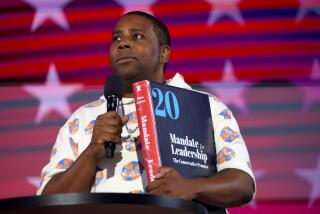POLITICS 88 : Simple Platform Urged as Democrats Start Document
WASHINGTON — Democrats on Tuesday began the task of writing their 1988 platform amid calls from some party leaders for a short and simple document that will help win back the voters who deserted them in the last two presidential elections.
But Jesse Jackson’s representative to the party’s platform committee, Congressional Delegate Walter E. Fauntroy of Washington, argued that, although the 1988 document “can be broadly based on principles,” it “must have some instructive examples.”
Among the “bottom-line specifics” proposed by Fauntroy were a tax increase on the wealthiest 5% of taxpayers and a decrease in military spending that would not imperil national security.
Outline for Debate
This discussion, taking place as the platform committee opened national hearings, appeared to shape the outline for the debate over the new platform that is expected in forthcoming sessions between Jackson’s supporters and other party leaders, including backers of the presumed nominee, Massachusetts Gov. Michael S. Dukakis.
As the candidate with the most convention delegates, Dukakis will be able to dominate the decisions of the platform committee. But his representative to the panel, former Maryland Rep. Michael D. Barnes, took a noncommittal position on the makeup of the platform in his testimony Tuesday and indicated to a reporter that Dukakis would be guided, at least to some extent, by the views of those testifying before the committee.
At the foundation of the debate over the platform is a proposal advanced last fall in a speech by Democratic National Committee Chairman Paul G. Kirk Jr. to make the 1988 platform “a brief and readable equivalent of an ‘open letter’ to the American people.”
Wooing Middle Class
Kirk contended that such an approach, contrasted with the lengthy and often controversial Democratic platforms of the past, would help the party win back “millions of middle- and working-class American families.”
That viewpoint was echoed in much of the comments heard at the open session of the committee Tuesday. For example, urging members of the party’s platform committee to avoid “premature promises,” Rep. Beryl Anthony Jr. of Arkansas, chairman of the House Democratic Campaign, said: “Let’s let the actions of the Democratic Administration and Congress speak louder than the promises of the platform.”
In response to a question, Anthony said his Democratic House colleagues are “overwhelmingly in favor” of what he called “a broad-based, strongly worded statement of principles without the check of a laundry list of promises.”
Supporting Anthony’s view and arguing that platforms in the past often did more harm than good to Democratic candidates, Illinois Rep. Marty Russo, a member of the platform committee, contended that during his 1984 reelection campaign, “the only time the platform was used, it was used against me.”
‘At Least One That Hums’
“Let’s be thematic,” said House Speaker Jim Wright of Texas, who called for a document “that will sing, even if not as long as one of those symphonies . . . but at least one that hums and one that gets it said.”
Not everyone agreed with the thematic approach. “We have some specific problems that need specific answers,” said Mayor Joseph Paolino of Providence, R.I., another witness before the committee. Paolino asserted that, if Democrats fail to deal with such problems in the platform, “then we have to re-examine ourselves.”
And Fauntroy, talking to reporters after his testimony, said the platform “must not be the generalized statement of principles that has been talked about in recent months. It must be clear that you (voters) have a choice.”
More to Read
Get the L.A. Times Politics newsletter
Deeply reported insights into legislation, politics and policy from Sacramento, Washington and beyond. In your inbox three times per week.
You may occasionally receive promotional content from the Los Angeles Times.










